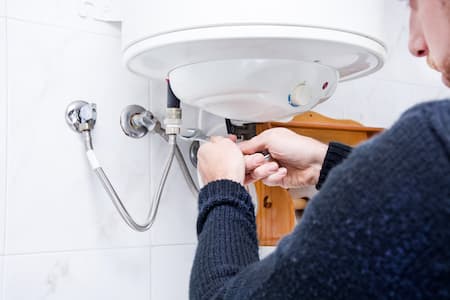Exploring Guide To To Common Problems
Exploring Guide To To Common Problems
Blog Article
Each person may have their unique conception when it comes to Common Problems with Your Home Water Heater.

Imagine starting your day without your routine hot shower. That already establishes an inadequate tone for the rest of your day.
Every residence needs a reputable water heater, but just a few recognize how to manage one. One simple method to maintain your hot water heater in leading shape is to look for mistakes consistently as well as repair them as soon as they show up.
Bear in mind to turn off your water heater prior to sniffing around for faults. These are the hot water heater mistakes you are most likely to encounter.
Water also hot or too cool
Every hot water heater has a thermostat that determines just how warm the water gets. If the water entering into your house is as well warm in spite of establishing a convenient optimum temperature, your thermostat might be defective.
On the other hand, too cold water may result from a stopped working thermostat, a busted circuit, or inappropriate gas flow. For instance, if you use a gas water heater with a broken pilot burner, you would obtain cold water, even if the thermostat is in best problem. For electric heating units, a blown fuse might be the wrongdoer.
Not enough warm water
Hot water heater come in numerous sizes, depending on your hot water demands. If you run out of hot water before everyone has had a bathroom, your water heater is too tiny for your family size. You need to consider installing a bigger water heater container or going with a tankless water heater, which takes up less room and is extra resilient.
Unusual noises
There are at least 5 sort of sounds you can learn through a water heater, yet one of the most typical interpretation is that it's time for the hot water heater to retire.
Firstly, you need to recognize with the regular sounds a hot water heater makes. An electric heating unit might seem various from a gas-powered one.
Popping or banging noises usually imply there is a slab of sediment in your storage tanks, and also it's time to cleanse it out. On the other hand, whistling or hissing audios might simply be your valves allowing some stress off.
Water leakages
Leaks could come from pipelines, water links, valves, or in the worst-case scenario, the tank itself. In time, water will corrode the storage tank, and locate its escape. If this takes place, you require to replace your hot water heater asap.
Nevertheless, before your adjustment your entire storage tank, be sure that all pipelines are in place and that each shutoff works flawlessly. If you still require aid determining a leakage, call your plumber.
Rust-colored water
Rust-colored water implies among your water heater elements is worn away. Maybe the anode pole, or the tank itself. Your plumber will certainly have the ability to identify which it is.
Warm water
Despite just how high you established the thermostat, you will not obtain any warm water out of a heating unit well past its prime. A hot water heater's efficiency may reduce with time.
You will likewise obtain warm water if your pipelines have a cross connection. This means that when you turn on a tap, warm water from the heating unit moves in along with regular, cold water. A cross link is easy to spot. If your warm water taps still follow closing the hot water heater shutoffs, you have a cross connection.
Discoloured Water
Rust is a major root cause of filthy or discoloured water. Corrosion within the water storage tank or a stopping working anode rod might trigger this discolouration. The anode rod shields the tank from rusting on the within and also ought to be checked annual. Without a rod or a properly functioning anode pole, the warm water rapidly rusts inside the tank. Get in touch with a professional water heater technician to identify if replacing the anode pole will certainly deal with the issue; if not, change your hot water heater.
Conclusion
Preferably, your hot water heater can last ten years prior to you require an adjustment. Nonetheless, after the 10-year mark, you might experience any of these faults extra frequently. At this moment, you ought to include a new water heater to your spending plan.
How To Troubleshoot 3 Common Water Heater Problems in Twin Cities
The Water Heater Is Leaking
A leaky cold water inlet valve A loose pipe fitting A leaky temperature and pressure relief valve A corroded anode rod A cracked tank Turn Off Your Water Heater:
Shut off your gas water heater by turning the gas valve on the unit to the “OFF” position. Shut off your electric water by switching its power off at your electrical panel. Look for a two-pole breaker labeled “water heater” and turn it to the “OFF” position. Move the ball valve connected to the water heater to be perpendicular to the piping at a 90° angle. Look for the Leak:
Depending on whether the water is coming from the tank's top or bottom, you’ll want to look for the leak in different locations.
If the leak comes from the top of the tank, carefully look for water escaping from the cold water inlet valve or loose pipe fittings. Rusted hot and cold water valves can have loose connections with the tank, with water leaking out of them.
https://mspplumbingheatingair.com/blog/how-to-troubleshoot-3-common-water-heater-problems
Do you enjoy reading up on Water Heater Repair and Troubleshooting? Write a review directly below. We would be interested to see your responses about this review. Hoping to see you back again before long. Sharing is caring. Helping people is fun. Bless you for your time. Visit us again soon.
Professional-grade solutions. Report this page